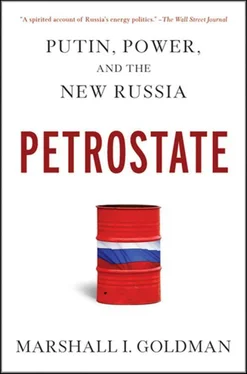As Russia’s petroleum production statistics suggest, petroleum has played an important if not crucial role in Russia’s economic and political life. But just as in other resource-rich countries, this role has not always been a positive one. Unless, as in the United States or Norway, there is an already established integrated market industrial infrastructure in place, there is a danger—as most if not all of the OPEC members have discovered—that relying on that oil and natural gas as the main export earners can corrupt the country. The availability of large deposits of petroleum and natural gas tends to bring with it an overreliance on those resources at the expense of more labor-intensive manufacturing and the development of technology and human capital.
RUSSIA—A VICTIM OF THE DUTCH DISEASE
No doubt the size of a country’s resource endowment does make a difference in the way that country develops. Economists often debate whether countries such as Japan, South Korea, Taiwan, and Switzerland would have developed industrially and technologically as they did if they had been more richly endowed. Conversely, if in 1917 the Germans had sent Lenin in that sealed train to Tokyo instead of Petrograd, it is most likely that the communist country that he would have created there would have ended up with a very different incentive system than the one adopted by what would become the Soviet Union. Because resources were so abundant in Russia, Soviet leaders set very low prices on their metals and fuels. Given the scarcity of such resources in Japan, the odds are that in a hypothetical Soviet Japan, raw material prices would have been much higher than they were in a Soviet Russia, reflecting that scarcity. And if Japan, South Korea, Taiwan, and Switzerland today were suddenly to discover new and abundant deposits of oil and gas, it is probable that, just like Russia, they too would price their raw materials cheaply and thus would also be afflicted with the Dutch disease, so called because once the Dutch found natural gas off their North Sea Coast, the relative prosperity it brought came at the expense of the country’s manufacturing sector. The export of that gas created a heavy demand for the Dutch guilder that the foreign buyers needed to pay for their purchases. This pushed up the value of the guilder. With a stronger currency, the citizens of the Netherlands found that imported goods were now cheaper than they were before as well as cheaper compared to goods manufactured within the Netherlands itself. The strong guilder also made Dutch exports more expensive for foreigners. Inevitably this had an adverse impact on domestic manufacturing and resulted in a loss of manufacturing jobs in Dutch factories.
The increase in the value of the ruble relative to other currencies— precipitated by the increase in both the price of a barrel of oil and the sharp increase in production and the export of Russian petroleum after 1999—also gave rise to what can be called the Russian Disease. 6Not only does a booming export market for energy resources have an adverse impact on domestic manufacturers but the appearance of a large and expanding petroleum sector inevitably triggers a ferocious struggle to win control of those oil-producing fields, at least in countries where the state allows the private ownership of energy-producing companies. Related to this struggle for control, whenever petroleum and gas industries begin to dominate a country’s economy, democratic institutions often seem to weaken if not collapse. Venezuela is one of the more recent examples.
Is a large petroleum and natural gas endowment a blessing or a curse? There is no all encompassing answer to such a question. In Norway, where the discovery of natural gas came many years after the country had already been industrialized, the disruption has been relatively minor. That is because the Norwegians understood that the sudden influx of energy export revenue can have a very negative effect on both the economy and the moral makeup of the country. For that reason the Norwegians have made a determined effort to shelter the rest of the economy from this energy windfall. They have set aside export revenues in a special fund to hold down inflation and prevent their currency from gaining too much value. So far they seem to have succeeded. As a result Norway’s oil and gas deposits have not become a curse. By contrast, it is hard to see how the average citizen in countries such as Libya, Iran, Nigeria, or even some in Saudi Arabia has benefited from his or her country’s energy riches.
How have its energy riches affected Russia? Given the predominance of energy in the makeup of both its GDP (about 30 percent) and its exports (almost 65 percent of the 2006 total), it might initially appear that, like Saudi Arabia, energy in Russia has had a similarly adverse impact on the effort to build up Russian industry. But this overlooks the fact that Russian industry has never been a competitive force in world markets comparable to industry in most of Europe, Japan, or the United States. Industry in the Czarist era before the Bolshevik Revolution was only just beginning to respond to domestic needs. In the Soviet years, the development of a domestic industry was a major goal of the central plan era and the Soviets did indeed create new industries. Yet after the disintegration of the USSR in 1991, it quickly became apparent that the domestic Russian industry created during the Soviet era was essentially of the hothouse variety, designed primarily to build up the country’s military-industrial complex. Such industries usually have a hard time when forced to sell in international markets, and those Russian manufacturers rarely were able to succeed on a purely competitive basis. Russian energy resources were used more as a lifeboat to support a non-market-oriented economy and the country’s industrial dinosaurs rather than as a stimulant to growth and the development of a world-class competitive manufacturing complex.
RUSSIA SUFFERS AND RECOVERS
Yet in contrast to its sometimes negative domestic economic, political, and social impact during both the Soviet and post-Soviet eras, Russian energy has played a major role in enhancing Russia’s international political standing. In many cases, it is almost as important as the development of the Soviet Union’s military capabilities. Energy exports opened up doors to Soviet influence in much of the third world prior to 1991, Cuba being the best example. But in a repeat of earlier burst bubbles, with the onset of the energy glut in the late 1980s and throughout the 1990s, Russian energy became irrelevant in the world’s energy balance. With production and exports down by almost 50 percent and crude oil prices hovering at a low of $10–$12 a barrel, Russia had trouble paying its bills and as a consequence suffered a massive financial collapse. On August 17, 1998, the government defaulted on its debt and most of the country’s private banks closed their doors and locked their vaults. As a result, not only the banks but the country as a whole teetered on the edge of bankruptcy. The ruble lost most of its value. But in a remarkably quick turnaround, in 1999 the global demand for energy began to outpace the producers’ ability to respond to that demand. As before in its history, as world energy markets quickly absorbed their spare capacity, Russia’s petroleum and gas suddenly took on a new importance, economically and especially politically. Fueled by petroleum prices for Brent oil that at one point in 2005 exceeded $70 a barrel, Russian companies responded by sharply increasing production. Forty percent of the world’s increased petroleum consumption from 2000 to 2004 came from Russia. As a result Russia found itself inundated not only with dollars and euros but with political leverage that in many respects exceeded anything enjoyed in either the Czarist or Soviet eras.
Читать дальше












